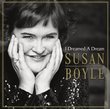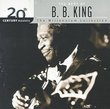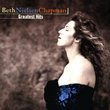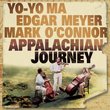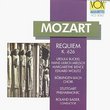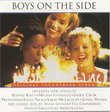| All Artists: Georges Bizet, Maria Callas, Nicolai Gedda, Georges Prêtre, Orchestre de Théâtre National de l'Opéra de Paris, Choeurs René Duclos, Robert Massard, Jane Berbié, Andrea Guiot, Claude Cales Title: Bizet: Carmen (complete opera) with Maria Callas, Nicolai Gedda, Georges Pretre, Paris Opera Orchestra Members Wishing: 0 Total Copies: 0 Label: EMI Classics Release Date: 8/19/1997 Genre: Classical Styles: Opera & Classical Vocal, Historical Periods, Modern, 20th, & 21st Century Number of Discs: 2 SwapaCD Credits: 2 UPCs: 724355628121, 724355628152 |
Search - Georges Bizet, Maria Callas, Nicolai Gedda :: Bizet: Carmen (complete opera) with Maria Callas, Nicolai Gedda, Georges Pretre, Paris Opera Orchestra
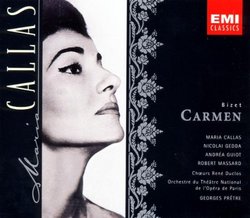 | Georges Bizet, Maria Callas, Nicolai Gedda Bizet: Carmen (complete opera) with Maria Callas, Nicolai Gedda, Georges Pretre, Paris Opera Orchestra Genre: Classical
This recording was made near the end of Maria Callas's career. It is a role she never sang onstage, but it suited her almost perfectly, and she gives a deep, compelling performance on this recording. The mezzo-soprano tess... more » |
Larger Image |
CD DetailsSynopsis
Amazon.com essential recording This recording was made near the end of Maria Callas's career. It is a role she never sang onstage, but it suited her almost perfectly, and she gives a deep, compelling performance on this recording. The mezzo-soprano tessitura was comfortable for her voice, and the role did not call for a pretty sound. Nor did the recording studio require the kind of huge vocal power expected in an opera house. And furthermore, the character of a strong-willed, capricious, sexually compelling woman who thinks exclusively of herself was close to the offstage personality that made Callas so famous. --Joe McLellan Similarly Requested CDs
|
CD ReviewsOne of the best. Suits Callas well; rest of cast great too. Marmez1@aol.com | Los Angeles, CA USA | 03/29/1999 (5 out of 5 stars) "There are several great versions of Carmen. Others include de los Angeles and Beecham, Maazel with Domingo and Maginnes, and even the old recording with Fritz Reiner has something to recommend it. However, this recording has to be on the top of any list. The role fits Callas to a T. Pretre does a wonderful job conducting, and Gedda is excellent. But it is Callas' ability to get into the skin of the character and radiate Carmen's sexuality and unpredictability, as well as her despair and desparation, that makes this version special. So if you want to own just one version, and you must have the finest modern sound, get the Maazel. On the other hand, if you want the most interesting conducting, get the Beecham. But if you want the most interesting Carmen, get this one. Serious opera lovers who understand that the fullest appreciation of a work comes from hearing different excellent versions will eventually buy all three." An indispensable Carmen - for Callas and beyond Marmez1@aol.com | 06/30/2000 (5 out of 5 stars) "I am a Callas fan but I don't run to her recordings based on just the fact that she's singing on them; for me all my favorite opera recordings have to bring the characters to life in ways that I can understand them, musically, dramatically and psychologically. Callas, for me, doesn't beat out other great singers for every possible operatic characterization; she does, however, beat them out with Carmen. Yes her voice here is a bit rife with Callas-prone idiosyncracies, some breaks... I've heard this performance called "ragged"; however after owning this version, all other Carmens I've listened to have sounded bland and missing something necessary. Callas's so-called "ragged" voice (very often gorgeous sounding) conjures up a breathtakingly husky portrait of the alluring gypsy; her crooning and fiery flashes are all tremendously exciting. Her mocking tones are beautifully understated; sharply angry sometimes, sexy another, but never raucous or coarse. I hate a vulgar Carmen. It is wonderful to hear what a great vocal actress can make of this complex character -- Callas never just "stands and sings" a melody, she involves herself in the psychology of the music, and here, with Carmen, it really pays off. There are two other elements in this recording which make it my unmatchable Carmen. Nicolai Gedda is perfectly paired as her Don Jose. I know it's just me... and a weird theory, but while I've occasionally been disappointed in his Italianate performances, his voice somehow takes on layers of deep golden beauty when he sings in the French language (his Faust and Hoffmann portrayals are unparalleled)... full of ardent heroism and melting passion... Gedda sometimes leaves the realm of men and sounds like a god. This Don Jose is close to being the best possible on record. His scenes with Callas are knock-outs musically. And then my final reason for worshipping this recording is Pretre's interpretation of the music. His conducting brings out so much of the sensuality in the music... it's beautiful and vivid. Pretre understands Carmen, the woman and the story. It's true that there are other fine Carmen recordings out there... most notably the magnificent Thomas Beecham version with a silvery De Los Angeles and again a marvelous Gedda (though his chemistry with Callas is more gripping); however I just donated that version to my library after realizing I somehow always needed a Callas/Pretre fix after listening to it. This is really quite a Carmen performance; an all-around wonderful recording." For Callas Fans Only Rudy Avila | Lennox, Ca United States | 07/24/2005 (5 out of 5 stars) "While I am not myself a devout Maria Callas fan, I do enjoy some roles which she uniquely interpreted and dramatically brought to life in a way that no one in her time was doing. She raised the bar high for all subsequent sopranos after the 60's(offically the decade she could not really sing with the bravura that made her famous). No opera lover can avoid hearing about her in any record store or opera house. She is the subject of discussion by the most hardcore opera connoisseurs. I genuinely enjoy Callas in following role: Norma (her absolute best and the role she sung the most number of times making her the owner of the role really) Medea (an intensely passionate Greek-fire role that she called upon her ancestry to interpet) La Sonnambula's Amina (beautifully moving role) and Tosca (brilliantly dramatic and passionate. As Carmen, however, she is only so-so. I think that this recording should not be anyone's first Carmen. This is a Carmen of an acquired taste, and moreover, a Carmen enjoyed strictly by Callas afficionados. I don't mean to put Callas down, as an artist she had integrity and commitment despite her perfectionism and diva antics. Her French diction is slurred and not elegant or even effectively dramatic. She is singing the French a la Italian opera, she struggles in the last word "fear" in her confrontation with Don Jose at the end of the last act - "I was warned you'd come here, I was even told to fear for my life but I'm brave and I am not afraid...she has an odd tremble at the word fear. The Habanera is not suited for her voice, neither is the Segudilla or her erotic dance and song for Don Jose -"Je vais danser en votre honeur". As Carmen, she comes off as too mature, too controlled and even too conservative. Carmen is young, wild, liberal, rebellious, defiant, dramatic. An older woman could never interpret Carmen as well as a younger one. Callas should have deigned to sing the role on stage early in her career and recorded it while she was still in her prime. Even if Carmen is out of a soprano's repertoire, Callas should have showed off her versatility by singing it anyways like so many sopranos did after her - Leontyne Price sang Carmen, Beverly Sills even sang Carmen in the 50's when she was still an obscure singer, and most recently soprano Angela Gheorghiu sung Carmen. My favorite Carmen on record and stage - Grace Bumbry. She's the best.
Callas fans will enjoy her in a role that was even too rare for her, and a role she loathed. It's interesting to notice how even a role she wouldn't do on stage (she called it vulgar) she sounds brilliant and very into the part. She is an older Carmen in this recording made in the 60's. Tenor Nicolai Gedda is doing a terrific job as Don Jose. He plays the role well, coloring his normally lyric voice to suit the darker character full of jealousy and possession of Carmen. They sound great together and there is tension between them right from the start. This was Callas' last recording, and again that makes this recording valuable. The next time Callas sung was in a series of farewell concerts, including one terrible one in Japan, and then she was gone forever. But her legacy lives on in dozens of recordings, especially under EMI, with whom she had an extensive contract." |

 Track Listings (21) - Disc #1
Track Listings (21) - Disc #1